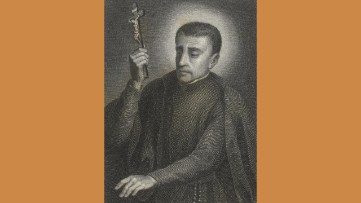St. Peter Claver, Jesuit, Apostle of Slaves

An unlikely friendship
At the University of Barcelona, Peter Claver studied and prayed. The young man, born in 1580 in the Catalan region of Spain, came to understand: “I must dedicate myself to the service of God until death.” He felt a call. Its clearer contours were still hidden from him, but he knew that he had to follow it. So at 20, Peter joined the Society of Jesus.
His superiors sent him to study philosophy in Mallorca, where he made an unlikely friend: Alphonsus Rodriguez, the elderly, uneducated lay brother who was the porter at the Jesuit college. Alphonsus may not have had much book-learning, but a life of suffering had taught him to listen to God. Peter noticed his holiness. “How can I love the Lord?” he asked the old man. “He gives me a great desire to follow him, but I don’t know how.” Alphonsus prayed, and the answer came to him: this young man with a great heart was destined for a suffering people far away.
At Alphonsus’ urging, Peter told his superiors of his desire to go to the missions. In 1610, he left for Cartagena in present-day Colombia, a center of the Spanish slave trade, where ships sailing from West Africa brought 10,000 new slaves yearly.
“Slave of the slaves”
Peter finished seminary in Cartagena, learning from the Jesuit missionary Alonso de Sandoval, who had ministered to the slaves. He was horrified by what he learned about their plight. When Peter, ordained in 1616, made his final profession as a Jesuit in 1622, he signed his vows, “Peter Claver, the slave of the Africans forever.”
He had found his calling. Before the slave ships entered port, Fr. Peter begged for bread, medicine, anything he could bring with him into those ships packed tightly with captives chained for so long that a third of the “cargo” died. He assembled a team of interpreters. As soon as a ship docked, this “slave of the slaves” descended into the dark holds. He brought food, but more importantly, he brought kindness to men and women driven mad with terror and suffering. He looked at them as if they were human beings, tended their wounds and lent his cloak to the shivering. “We must speak with our hands,” he said, “before we speak to them with our lips.”
His hands spoke, and so when he assured these people that God loved them despite the cruelty that men had inflicted on them, they listened. Using simple pictures, he taught them the Christian faith. In small groups, he baptized them – which not only made them members of Christ’s body, but enabled Peter to call upon the slave masters to treat their fellow Christians more humanely.
The apostle of Cartagena
For forty years, Peter descended into the slave ships. He preached, too: to slave traders, criminals and the well-to-do, inviting all to a conversion of heart. Though irritated at his work on behalf of the slaves, the wealthy grudgingly came to admit that this priest was a force to be reckoned with. While at first they came to listen to the holy priest but refused to enter the same churches as the slaves, decades of preaching began to effect a slow, difficult opening of the heart. But preaching alone could not complete it.
In 1650, Fr. Peter caught the plague. He survived, but his body was broken. For four years, he lay in bed, half-starved by the servant charged with caring for him. No one paid him much mind. It seemed as if the “apostle of Cartagena” had been forgotten. He prayed, accepting his sufferings as a penance for his sins. Yet in 1654, when word got out that Fr. Peter had received last rites, the city suddenly remembered the man who had been its conscience. A flood of visitors came to pay their respects. When he died on September 8, Cartagena buried him at pubic expense. Only then did they realize what they had had in their midst: this man, whose hands spoke the language of God’s compassion, had baptized 300,000 slaves and heard over 5,000 slaves’ confessions a year.
In 1888, Peter Claver was canonized together with Alphonsus Rodriguez, his friend who had helped him to follow his Lord.







